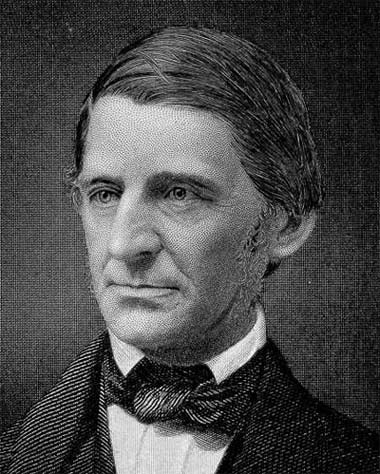"In the presence of nature, a wild delight runs through the man, in spite of real sorrows."

| Nature Writing |  |
|
|---|---|---|
| Ralph Waldo Emerson, 1803 –1882 | ||
| Nature, | 1836 | |
"Nature never became
a toy to a wise spirit. The flowers, the animals, the mountains, reflected
the wisdom of his best hour, as much as they had delighted the simplicity of
his childhood.
This is the best part of these men's farms, yet
to this their warranty-deeds give no title.
A scene, not unlike the description Emerson makes of the village, to distinguish between owning and participating in terrain. Childe Hassam, oil on canvass, American.
To speak truly, few adult persons can see nature. Most persons do not see the sun. At least they have a very superficial seeing. The sun illuminates only the eye of the man, but shines into the eye and the heart of the child. The lover of nature is he whose inward and outward senses are still truly adjusted to each other; who has retained the spirit of infancy even into the era of manhood. His intercourse with heaven and earth, becomes part of his daily food. In the presence of nature, a wild delight runs through the man, in spite of real sorrows."
What does the author mean by each section above?
1.
Do the highlighted sentences alter, or enhance the meaning?
Emerson is expressing his worldview, but we can also see that he is describing a pre-Darwinian weltanschauung. How is that scope of vision he has developed above?
An essay writing about world views
Emerson on Nature 1836
Let us interrogate the great apparition, that shines so peacefully around us. Let us inquire, to what end is nature?
All science has one aim, namely, to find a theory of nature.
the universe is composed of Nature and the Soul
Nature, in the common sense, refers to essences unchanged by man; space, the air, the river, the leaf.
Chapter I Nature
One might think the atmosphere was made transparent with this design, to give man, in the heavenly bodies, the perpetual presence of the sublime.
Nature never became a toy to a wise spirit.
When we speak of nature in this manner, we have a distinct but most poetical sense in the mind. We mean the integrity of impression made by manifold natural objects.
It is this which distinguishes the stick of timber of the wood-cutter, from the tree of the poet. The charming landscape which I saw this morning, is indubitably made up of some twenty or thirty farms. Miller owns this field, Locke that, and Manning the woodland beyond. But none of them owns the landscape. There is a property in the horizon which no man has but he whose eye can integrate all the parts, that is, the poet. This is the best part of these men's farms, yet to this their warranty-deeds give no title.
To speak truly, few adult persons can see nature.
In the presence of nature, a wild delight runs through the man, in spite of real sorrows. Nature says, -- he is my creature, and maugre all his impertinent griefs, he shall be glad with me.
In the woods, is perpetual youth. Within these plantations of God, a decorum and sanctity reign, a perennial festival is dressed, and the guest sees not how he should tire of them in a thousand years. In the woods, we return to reason and faith.
I become a transparent eye-ball; I am nothing; I see all; the currents of the Universal Being circulate through me; I am part or particle of God.
I am the lover of uncontained and immortal beauty. In the wilderness, I find something more dear and connate than in streets or villages. In the tranquil landscape, and especially in the distant line of the horizon, man beholds somewhat as beautiful as his own nature.
The greatest delight which the fields and woods minister, is the suggestion of an occult relation between man and the vegetable. I am not alone and unacknowledged.
Chapter 4: Language §3
By degrees we may come to know the primitive sense of the permanent objects of nature, so that the world shall be to us an open book, and every form significant of its hidden life and final cause.
Chapter 5: Discipline
IN view of the significance of nature, we arrive at once at a new fact, that nature is a discipline.
To the senses and the unrenewed understanding, belongs a sort of instinctive belief in the absolute existence of nature. In their view, man and nature are indissolubly joined.
The sublime remark of Euler on his law of arches, "This will be found contrary to all experience, yet is true;" had already transferred nature into the mind, and left matter like an outcast corpse.
Chapter 6: Idealism
Three problems are put by nature to the mind; What is matter? Whence is it? and Whereto?It is a remoter and inferior incarnation of God, a projection of God in the unconscious. But it differs from the body in one important respect. It is not, like that, now subjected to the human will. Its serene order is inviolable by us.
Chapter 8: Prospects
The problem of restoring to the world original and eternal beauty, is solved by the redemption of the soul.
The invariable mark of wisdom is to see the miraculous in the common.
So shall we come to look at the world with new eyes.
`Nature is not fixed but fluid.
The kingdom of man over nature, which cometh not with observation, -- a dominion such as now is beyond his dream of God, -- he shall enter without more wonder than the blind man feels who is gradually restored to perfect sight.'
http://www.vcu.edu/engweb/transcendentalism/authors/emerson/essays/naturetext.html#1
Ties to
• Environmental history, related to